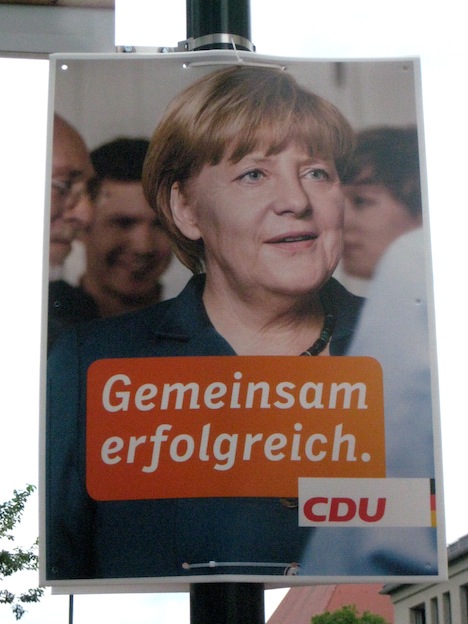What better way to kick off Germany’s election day — and the second full day of Oktoberfest in Munich — with Johannes Brahms’s ‘Academic Festival Overture,’ a loose assortment of what amounts to student drinking songs?![]()
Germany, with 80 million citizens, is the most populous member of the European Union, and it’s also the economic engine of Europe these days, for better or worse.
Angela Merkel, chancellor for the past eight years, is almost certainly likely to continue as chancellor, with her center-right Christlich Demokratische Union Deutschlands (CDU, Christian Democratic Party) and the CDU’s Bavarian sister party, the Christlich-Soziale Union in Bayern (CSU, the Christian Social Union), poised to win more than 10% to 15% more than the center-left Sozialdemokratische Partei Deutschlands (SPD, Social Democratic Party).
German voters will cast two ballots — for a local representative in each of 299 districts, plus the national ‘party vote’ for a political party to determine an additional 299 seats in the lower house of Germany’s parliament, the Bundestag. The ‘party vote’ generally determines the proportion of seats that a party will hold in the Bundestag.
The drama comes down to whether Merkel will be able to continue her coalition with the liberal Freie Demokratische Partei (FDP, Free Democratic Party) — which is polling at around just 5%, the threshold to win seats in the Bundestag — or be forced back into a ‘grand coalition’ with the SPD. Or, as I’ve argued at EurActiv, the third possibility is a historical ‘black-green’ coalition with Die Grünen (the Greens).
We’ll have a pretty good idea in about 10 hours of the universe of possibilities.
Between now and then, check out some of Suffragio‘s prior German election campaign coverage:
- A preview of the state elections in Hesse, Germany’s fifth-most populous state, also being held today — and how it could shift the upper house of Germany’s parliament, the Bundesrat, further left.
- A glossary of everything you basically need to know to sound smart about Germany’s federal elections.
- An examination of the former East Germany — and how it’s developed, both good and bad, since reunification in 1990.
- What Greece can expect in the way of a bailout (or other deals) from Germany and the European Union after today’s elections.
- The election-week scandal surrounding the Greens.
- A review of the elections — held last Sunday, September 15 — in Bavaria, a conservative heartland, where the CSU romped to an absolute majority (and the FDP failed to win the 5% necessary to win seats in the Landtag, the state parliament).
- A look at how the SPD’s chancellor candidate Peer Steinbrück became such a flop on the campaign trail — and his final whopper of a gaffe.
Photo credit to Alex Cole.

Matematyka z plusem sprawdziany
I do not know whether it’s just me or if everybody else experiencing problems with your blog.
It appears like some of the written text on your posts are running off the screen.
Can somebody else please provide feedback and let me know if this is happening to them too?
This could be a problem with my internet browser because I’ve had this happen before.
Kudos
If you copy that same URL and paste it into your browser, you
won’t be blocked. Google may consider the so-called anchor text within the link (the word
or phrase which is linked) and the authority of the website that the link is coming from to determine how highly or lowly your website ought to rank.
And the 10th dumbest thing NOT to do with Google Ad – Sense is to
let the other nine things stop you from running an honest site that.